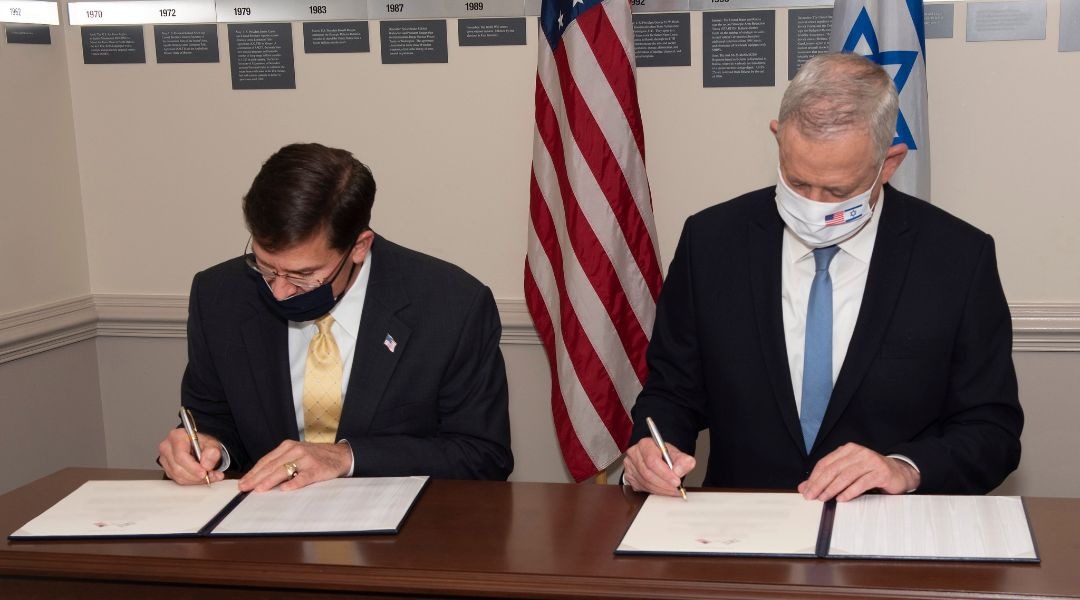(JTA) — The United States’ commitment to Israel’s “qualitative military edge” — or having the strongest armed forces in the Middle East — is longstanding and baked into the countries’ relationship, and into U.S. law.
But the Pentagon’s proposed sale of advanced combat aircraft to the United Arab Emirates has stirred concerns among supporters of Israel that that commitment could be at risk.
The Trump administration appeared to resolve the potential conflict this week, providing reassurances sought by Israel on what is known as QME and Israel in turn announcing it would not oppose America’s sale of F-35 stealth fighters to the United Arab Emirates,
Israeli Defense Minister Benny Gantz and Mike Esper, the U.S. secretary of defense, came together on Thursday to reassert the United States’ commitment to maintaining Israel’s edge in a declaration signed jointly Thursday in Washington, D.C.
Gantz and Esper posed for photos after signing the declaration, and in his remarks Gantz alluded to the underlying reason for the appearance: Israel is opposed to the sale of F-35 stealth fighters to the United Arab Emirates, even though the Trump administration brokered a normalization deal last month between the two countries.
But on Friday Gantz and Israeli Prime Minister Benjamin Netanyahu issued a joint statement announcing that in light of the reassurances from the Trump administration, they would not oppose the F-35 sale. Netanyahu issued a subsequent statement saying that Israel would not oppose the sale of certain weapons system to UAE so long as the sales are “anchored in an agreement with the United States which upgrades Israel’s Qualitative Military Edge and guarantees it’s superiority in the Middle East for the coming decades.”
Israeli leaders had been seeking affirmations that if the sale goes through, there will be guarantees that the aircraft do not challenge Israel’s regional preeminence. The Trump administration says the UAE needs the planes to deter the enemy the Emirates shares with Israel: Iran.
“Over the last few weeks, you and I led, together with other people, very good and very important discussions that reassure the bipartisan commitment to Israel’s QME,” Gantz said at the signing with Esper. “I want to thank you and your people, and the American administration, for supporting it. Now that we are entering an era of positive normalization processes in the Middle East, which actually can face an aggressive Iran across the region, this ability of continued cooperation is so very important.”
Democrats in Congress have introduced legislation that would allow Israel a say on the U.S. sale of military hardware to the Middle East.
Consolidation of the normalization deals between Israel and the UAE and Israel and Bahrain, called the Abraham Accords, are continuing apace. Vast majorities of lawmakers in both chambers of Congress have agreed to cosponsor non-binding resolutions praising the deals. The American Israel Public Affairs Committee lobbied for the resolutions.
Direct flights from Israel to both countries have commenced, and there was a direct flight this week from Israel to Sudan, which President Donald Trump has said may be the next country to normalize relations with Israel. The United Arab Emirates and Israel have agreed to allow citizens to fly between their countries without prior visas.
The United Arab Emirates, the United States and Israel jointly announced a plan called the Abraham Fund that would raise $3 billion from the private sector for investment in the Middle East.
On Monday, delegations of top officials from Israel and the United States met in Bahrain to sign joint Israel-Bahrain agreements on economic and trade cooperation, air services, agriculture, telecommunications and postal services, visas, financial services. Bahrain was set Thursday to sign a memorandum of understanding with the United States on combating anti-Semitism.
JTA has documented Jewish history in real-time for over a century. Keep our journalism strong by joining us in supporting independent, award-winning reporting.






